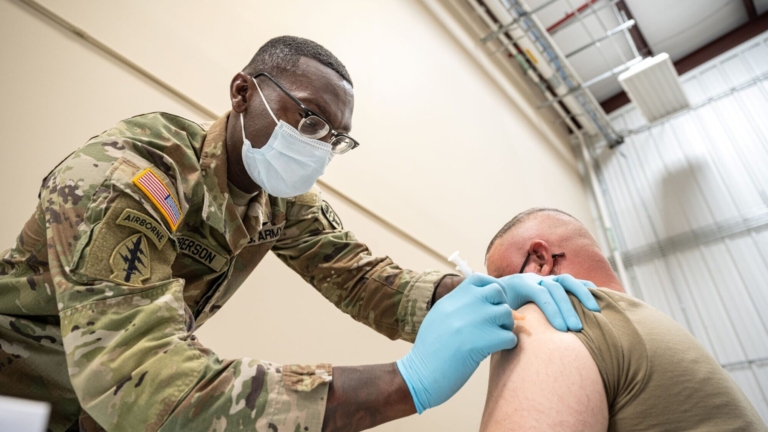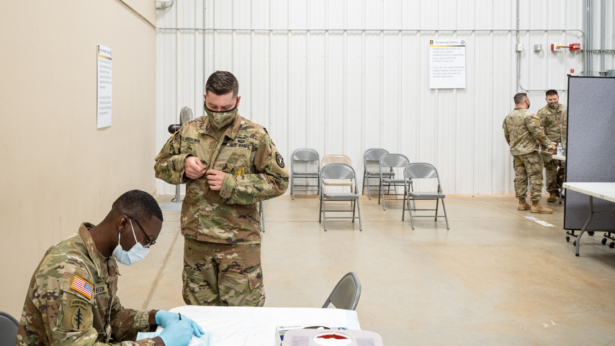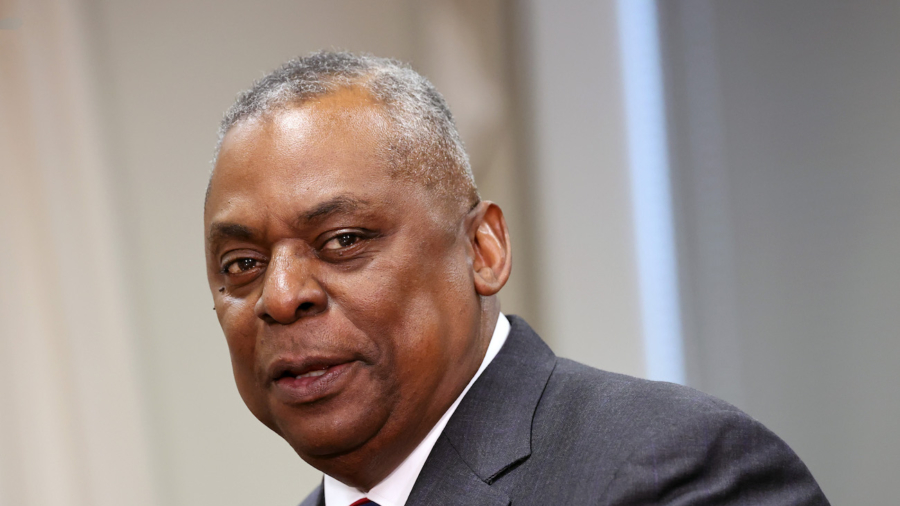The Department of Defense is formally ending the COVID-19 vaccine mandate for the U.S. military and the National Guard, but did not provide any signal as to whether those discharged over having refused the vaccine would have any chance of being reenlisted.
Meanwhile, for those who are currently serving in the armed forces, none “shall be separated solely on the basis of their refusal to receive the COVID-19 vaccination if they sought an accommodation on religious, administrative, or medical grounds,” Secretary of Defense Lloyd Austin wrote in a memorandum (pdf) on Jan. 10.
“The Military Departments will update the records of such individuals to remove any adverse actions solely associated with denials of such requests, including letters of reprimand,” Austin said in the memo. “The Secretaries of the Military Departments will further cease any ongoing reviews of current Service member religious, administrative, or medical accommodation requests solely for exemption from the COVID-19 vaccine or appeals of denials of such requests.”
The directive comes after a Pentagon official announced on Jan. 5 the department had rescinded the mandate and was in the process of developing “further guidance” on vaccines for the force.
All actions related to the COVID-19 vaccine mandate, which Austin had imposed in August 2021, had been halted by the Pentagon in late December 2022.

Austin said in the Jan. 10 memo that COVID-19 vaccines have been given to over 2 million service members and that 96 percent of the active and reserve forces are fully vaccinated against COVID-19. He said he is “deeply proud” of the Pentagon’s efforts to combat COVID-19.
More than 8,000 service members have been discharged for refusing the vaccine.
The Pentagon “will continue to promote and encourage COVID-19 vaccination for all Service members,” Austin said.
For the service members who were administratively discharged “on the sole basis that the Service member failed to obey a lawful order” to take the vaccine, Austin said the Pentagon is prevented by law from giving anything less than a general (under honorable conditions) discharge. A general discharge is a step down from an honorable discharge and is generally given to troops who had satisfactory service but had minor misconduct.
Those who received a general discharge may petition their military department’s discharge review boards for “correction of military or naval records” to request a correction to the characterization of their discharge, he said.
Reenlistment Unclear After Thousands Discharged
President Joe Biden, on Dec. 23, 2022, signed into law the $858 billion National Defense Authorization Act (NDAA) for the fiscal year 2023, which had passed via bipartisan majorities in the House and Senate. The legislation stipulated that Austin must rescind the COVID-19 vaccine mandate for members of the armed forces within 30 days of Biden’s signature.
Austin cited the legislation in repealing the mandates issued in August 2021 for U.S. military members and in November 2021 for the National Guard.
Republican lawmakers, who comprised the minority in both chambers last year, had pushed for the removal of the vaccine mandate and celebrated the provision in the NDAA upon its passing in the House and Senate.
The Pentagon discharged a total of “3,300 Marines, 1,800 soldiers, 1,800 sailors, and 900 airmen simply based on their personal decision to not take the COVID vaccine,” House Speaker Kevin McCarthy (R-Calif.) said in a statement on Dec. 6, 2022.
“These heroes deserve justice now that the mandate is no more,” he said. “The Biden administration must correct service records and not stand in the way of reenlisting any service member discharged simply for not taking the COVID vaccine.”
The Pentagon has not immediately responded to a request for comment from The Epoch Times on whether it has any plans to reenlist those who had been discharged for the sole reason of refusing the COVID-19 vaccine.

Opposition to Mandates
Until the passing of the NDAA, the military COVID-19 mandates had been kept in place—even amid plummeting efficacy of the vaccine against infection and severe illness since the spread of the Omicron variant in late 2021, and research suggesting that natural immunity could be more effective than vaccination.
The mandates saw resistance among troops and Americans at large, including lawmakers in Congress, who argued in favor of bodily autonomy free from coercion.
Even before the mandates, Rep. Thomas Massie (R-Ky.) in July 2021 shared that military members said they would quit instead of receiving a COVID-19 vaccine.
By October 2022, just two months before Congress passed the NDAA, The Epoch Times reported that military officers who became injured after their COVID-19 vaccinations called for the mandate to be scrapped.
The military has notoriously issued mass rejections for religious requests for exemptions to the mandate, triggering multiple court challenges. Judges had blocked three of the four branches from discharging most members seeking religious exemptions over the treatment, which the judges said violated the Religious Freedom Restoration Act.
Just 0.5 percent of the religious accommodation requests have been approved by the Marines, followed by 1 percent for the Navy, 2.3 percent for the Air Force, and 6 percent for the Army. Thousands of requests were still not adjudicated before the mandate was withdrawn.
Troop Retention Concerns
McCarthy said in December the Army and Navy “missed their 2022 recruitment goals by thousands of service members.” Meanwhile, noting the thousands discharged, McCarthy said the COVID-19 vaccine mandate “was detrimental to the ranks, and there is no doubt it put our national security at risk.”
McCarthy’s concerns over military retention were reflected in a projection by the Army National Guard in October 2022 of a loss of as many as 14,000 soldiers across the country over the next two years. This was attributed to refusals to comply with the COVID-19 vaccine mandate. A loss of 9,000 soldiers was projected for the fiscal year 2023, and another 5,000 soldiers was projected for fiscal 2024, if the mandate persisted.
Austin, also on Dec. 6, 2022, drew public attention to recruitment and said there’s no “hard data that directly links the COVID mandate to an affect on our recruiting.” A day later, Deputy Pentagon Press Secretary Sabrina Singh said in a statement that the mandate “appears to have very minimal impact on recruiting.” The two did not comment on retention.
Zachary Stieber contributed to this report.
From The Epoch Times

